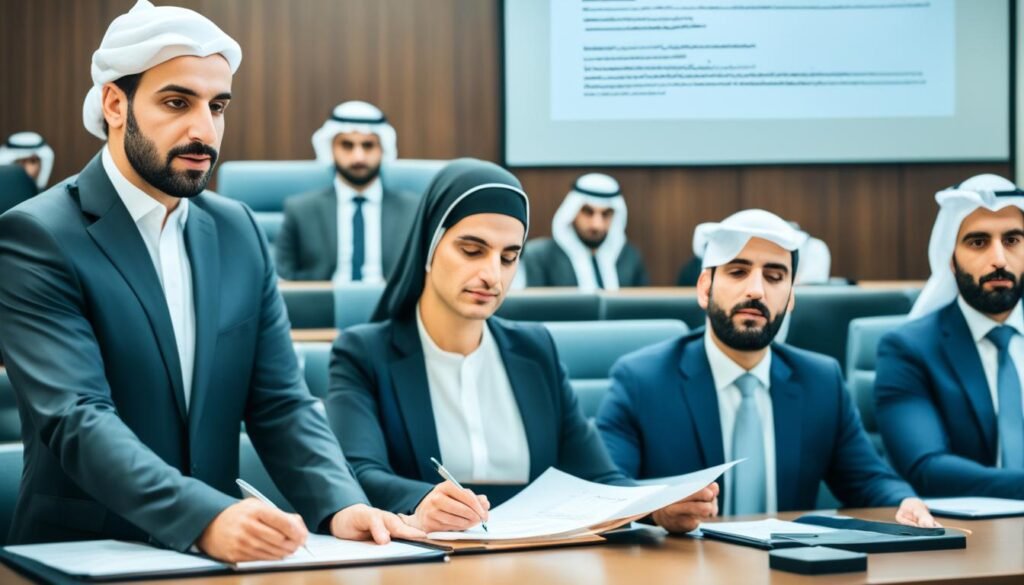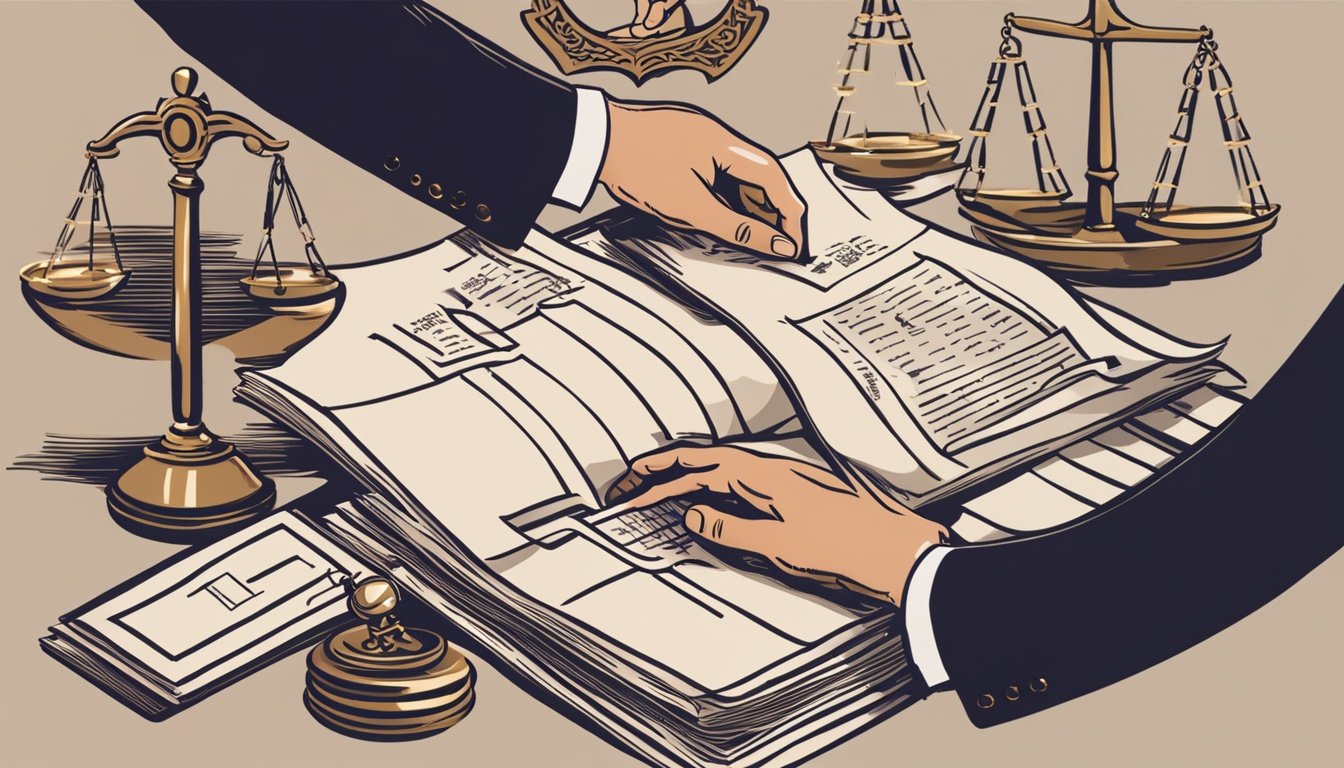Have you ever thought about how important Arabic to English translators are in the UAE’s busy business world? In a place where global trade is big, these translators are key. They help connect people and make sure legal documents are clear.
Legal translation in the UAE can really change the outcome of business deals. It’s not just about changing words from one language to another. It’s about keeping the detailed legal meanings that could affect a lot of things. With more global investors coming to the UAE, the need for skilled translators has grown a lot.
In the UAE, where many cultures meet, legal translation services are very important. They make sure every contract and legal paper is understood by everyone. This is crucial for keeping the UAE known as a trustworthy place for global business.
Key Takeaways
- Arabic to English translators are vital for international business in the UAE
- Legal translation ensures compliance with UAE regulations
- Accurate translations prevent misunderstandings in legal proceedings
- The UAE Ministry of Justice oversees translator certification
- Legal translation promotes equal access to justice in a multilingual society
The Importance of Legal Translation in the UAE

Legal translation is key in the United Arab Emirates, a major business center. It ensures accurate translations for companies from around the world. The UAE’s legal system needs clear communication across languages.
Facilitating International Business Transactions
In the UAE, legal translation helps bridge language gaps for global companies. It makes business smoother and builds trust with local and international partners. While machine translation has improved, human translators are still vital for legal documents. They ensure the accuracy needed.
Ensuring Accurate Communication in Legal Proceedings
Legal cases in the UAE often involve different languages. It’s crucial to have precise translations for fair outcomes in disputes across borders. Tools in computational linguistics help translators keep legal terms consistent. This mix of technology and human skill keeps legal processes fair.
Complying with UAE Legal Requirements
The UAE requires Arabic translations for many official documents. Not having accurate translations can lead to big legal problems. Skilled translators know UAE laws well, helping businesses follow the rules. This shows how important legal translators are in the UAE.
Understanding the Complexities of Arabic Legal Language

Arabic legal language is tough for translation engines and bilingual corpora. Modern Standard Arabic (MSA) in legal documents needs special knowledge. We’ll look at what makes Arabic legal texts complex.
Archaic Terminology and Legal Doublets
Arabic legal documents have old terms and legal doublets. These can confuse even native speakers who don’t know legal terms. Translation engines find it hard to understand these tricky words, showing the need for human translators.
Long Sentences and Complex Structures
Arabic legal texts often have long, complex sentences. They might have many clauses, making it hard for translation engines to keep things clear and right. These sentences need careful thought to keep the meaning clear.
Nominalization and Passivation in Arabic Legal Texts
Arabic legal documents use nominalization and passive voice a lot. These make it hard to see who or what is doing something, adding to the translation challenge. Getting these right is key for legal accuracy.
| Feature | Challenge | Impact on Translation |
|---|---|---|
| Archaic Terminology | Unfamiliar to non-experts | Requires specialized knowledge |
| Complex Sentences | Multiple clauses and structures | Difficult to maintain coherence |
| Nominalization | Obscures subject or agent | Demands careful interpretation |
These challenges show why we need professional translators with legal knowledge in Arabic-English translation. While machines help a lot, Arabic legal language’s complexity often needs human touch for correct translation.
The Role of Arabic to English Language Translators in Legal Documents
In the UAE, Arabic to English language translators are crucial. They help connect Arabic and English in legal documents. This includes things like immigration papers, business deals, and official contracts. Many UAE government departments need documents in Arabic.
Translators need to know both languages and the law. They must understand complex terms and keep up with new laws. They use special techniques to translate legal texts.
Advanced language models have changed how we translate. These models, based on neural networks, make translations more accurate and fast. They catch subtleties that old methods might miss.
| Document Type | Translation Challenges | Technology Used |
|---|---|---|
| Business Contracts | Technical terminology | Specialized legal glossaries |
| Court Documents | Legal jargon | AI-powered translation tools |
| Immigration Papers | Cultural context | Neural machine translation |
Translators are vital for smooth business in the UAE. They use their knowledge and advanced tools to help in today’s global legal world.
Challenges in Translating Legal Documents from Arabic to English

Translators of Arabic to English face special challenges with legal documents. We’ll look into these challenges and how they affect the translation process.
Differences in Legal Systems
The legal system in the UAE is quite different from those in English-speaking countries. This difference makes it hard for translators. They need to understand both Islamic law and common law. Often, legal terms don’t have direct translations, so translators must be creative and precise.
Cultural Nuances and Context
Legal documents are full of cultural details. Translators must handle these carefully to get the meaning right. It’s not just about translating words. They need to know both cultures well to interpret correctly.
Maintaining Accuracy and Precision
Getting legal translations right is very important. A small mistake can change the whole meaning. Translators need to know both language and law well. While machines can help, human translators are key for accuracy in legal texts.
| Challenge | Impact | Solution |
|---|---|---|
| Legal system differences | Misinterpretation of legal concepts | Specialized legal knowledge |
| Cultural nuances | Loss of context and meaning | Cultural expertise |
| Accuracy demands | Potential legal consequences | Rigorous quality control |
Qualifications and Skills Required for Legal Translators in the UAE

Legal translators in the UAE need special skills to do well. We value having experts who can connect Arabic and English legal documents.
Being fluent in Arabic and English is key. It’s not just about talking. Translators must understand complex legal ideas in both languages. Knowing about computational linguistics helps them see language structures better.
Having professional qualifications in legal translation is vital. Many take special courses or degrees to improve their skills. Knowing about translation engines can make them work faster, but human touch is still key in legal work.
Knowing the UAE legal system is a must. Translators need to know local laws, rules, and legal steps. This ensures they translate legal documents correctly.
| Skill | Importance | Related Tools |
|---|---|---|
| Language Proficiency | Critical | Bilingual corpora |
| Legal Knowledge | Essential | Legal databases |
| Technical Skills | Beneficial | Translation software |
| Cultural Awareness | Important | Cultural resources |
Pay attention to details and understand different cultures. These skills make a legal translator in the UAE good at their job. They make sure legal texts are correctly shared between languages and cultures.
The Impact of Accurate Legal Translation on Business Operations
Accurate legal translation is key for smooth business operations. Language models and statistical models have made translations better. Yet, human expertise is still vital in legal matters.
Preventing Misunderstandings and Legal Disputes
Clear communication is crucial in legal matters. Precise translations prevent misunderstandings. Advanced neural networks help catch subtle nuances that could lead to disputes. This saves time, money, and protects business relationships.
Ensuring Compliance with Local Regulations
In the UAE, following local laws is essential for businesses. Accurate translations help companies understand and follow these laws. Language models make processing large volumes of legal text easier, making compliance simpler and more efficient.
Facilitating Cross-Border Transactions
Global business deals need clear communication. Precise legal translations ensure all parties know their roles and duties. Statistical models help maintain consistency across complex documents. This builds trust and speeds up international transactions.

